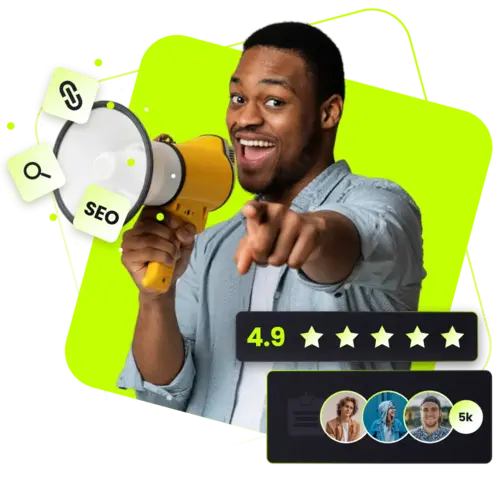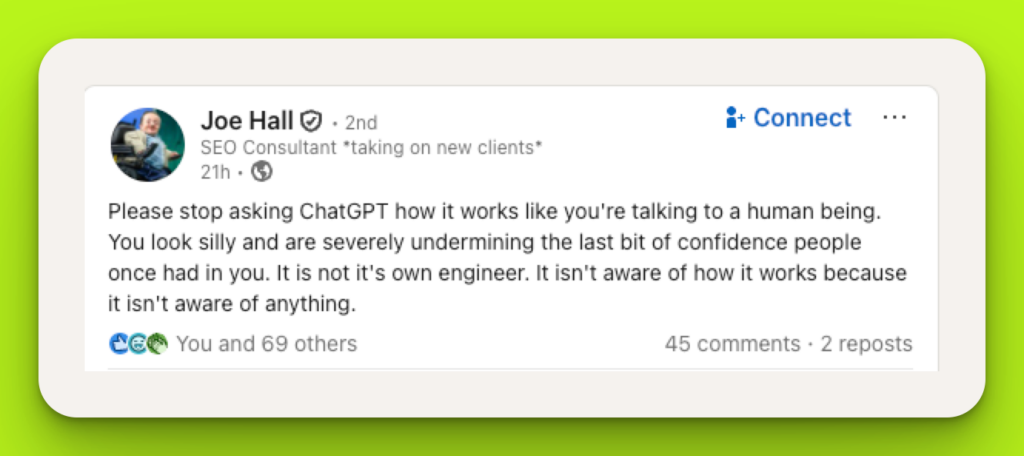Automation bias.
You may not have heard of it, but you’ve almost certainly experienced it – often from a client, or possibly even your own mind.
But what is it? And why is it such a problem in SEO?
The opening sentence of the Wikipedia page sums it up rather nicely, so I’ll borrow that:
“Automation bias is the propensity for humans to favor suggestions from automated decision-making systems and to ignore contradictory information made without automation, even if it is correct.”
What does that mean? It means that often humans will believe the output from a system or tool, even if their own knowledge contradicts that output.
Sounds bad, right? It is.
I first came across this term in a Medlife Crisis video about someone who was poisoned after following ChatGPT’s medical advice.
Is Dr. Rohin from Medlife Crisis an SEO? No, but his breakdown of human propensity towards automation bias rang a lot of alarm bells in my head for what we’re seeing in SEO and marketing right now – especially with the rise of ChatGPT.
SEOs Love Their Scores
Sure, not all SEOs. The thought leaders out there may have moved past DA and Spam Scores, but the average practitioner hasn’t.
SEO props up whole industries of tools and widgets dedicated to summarising your performance, a link’s potential, a keyword’s difficulty, all in a single, easy-to-consume score.
Handy, right?
Of course! But only when paired with critical thinking.
It’s easiest to think of examples to the contrary with this when it comes to site score metrics, as these are often the “fuzziest” (due in part to companies understandably not wanting to give away the “secret sauce” of how their tools work).
These scores can be immensely handy for SEOs to get a rough and ready estimation of how a site is doing, and how suitable it might be for them to work with – but it shouldn’t be to the exclusion of your own knowledge!
This goes both ways – it’s easiest to complain about metrics declaring a site “bad” when you think it’s a great placement opportunity, but it absolutely happens the other way too.
Ever seen a site that is great by every available metric, but it just feels off? The SEO Spidey sense is ringing alarm bells? Of course you have – but did you push back against the tool/report, or did you cave to automation bias?
ChatGPT Is Pouring Petrol On The Automation Bias Fire
The arrival of ChatGPT (and other AI chatbots – shoutout to that Medlife video for his take on Grok) has quite simply supercharged this problem.
Again, this can be taken more widely than SEO (see again the video about a man literally poisoning himself), but SEO is nominally what I know, so we’ll stick there.
An alarming number of SEOs are taking content and SEO decisions purely on the advice of ChatGPT itself – even going so far as to ask ChatGPT how it works then implementing that as SEO advice.
That’d be great if ChatGPT had any conception of how it works – but it doesn’t.
It’s a double-edged sword.
On the one hand, it can provide abysmal SEO advice or content, but it’s trusted simply because it’s an automated output so it must be right. Oh and they told it it’s to reply as “the ultimate #1 best SEO practitioner ever”.
Or, it’s supercharging confirmation bias as it confirms your every decision is amazing and insightful – and it must be right as it’s an automated tool and not biased like you!
(Previous models like 4o were so sycophantic that they had to develop entire updates just to counteract it.)
The Upshot: What Do We Do?
Sadly, I’m not here to fix human psychology.
There is some positive pushback against tools that I see.
Often, it will be that a certain score is simply “a vanity metric” or asserting that a given score is actually easy to manipulate.
This is a great place to start – reasoned skepticism – but it doesn’t go the full distance.
Again, I’m sure that you, reading this, don’t fall into this category – but never underestimate how deep down the well “SEOs” go.
Just check on Fiverr if you ever need a reality check on what’s occurring outside of your shiny, ethical agency.
Ultimately, there’s no one easy fix – I just find it handy to be aware of the phenomenon during your client communication and to understand, just a bit more, why clients may cling to scores over the sense of your advice!
Become a Pro at SEO
Join 65,000 others and learn the secrets to SEO success with our weekly blog posts.

